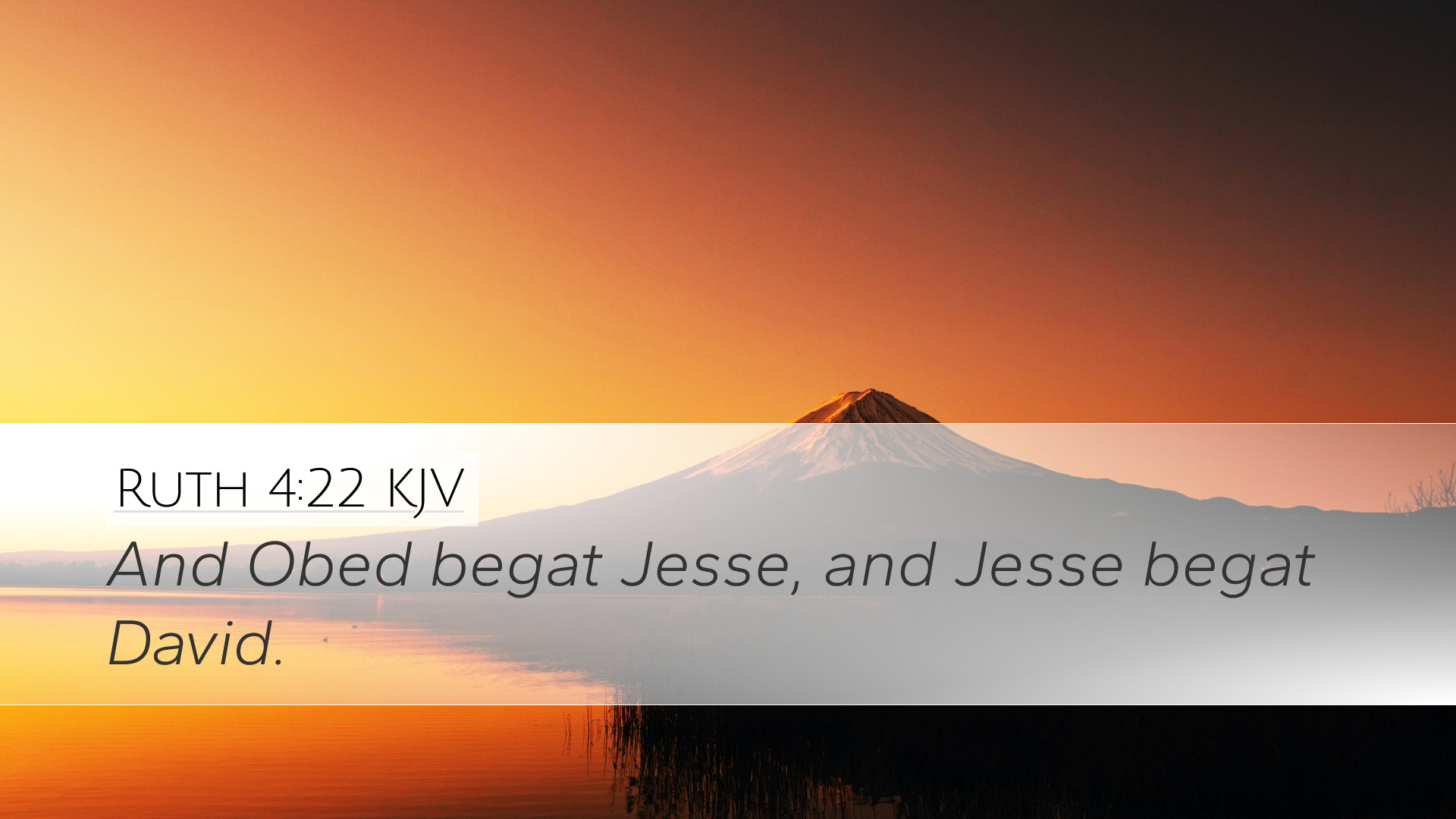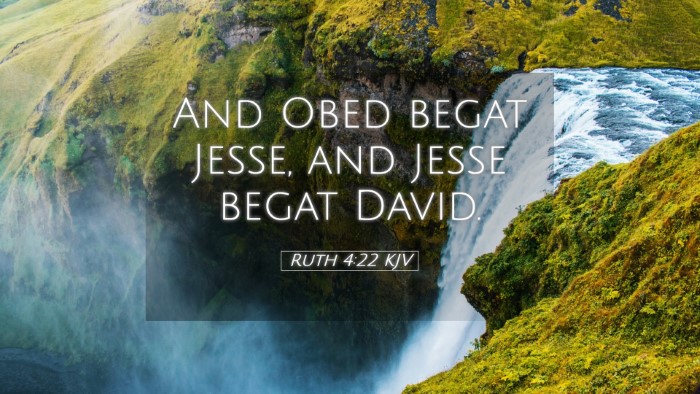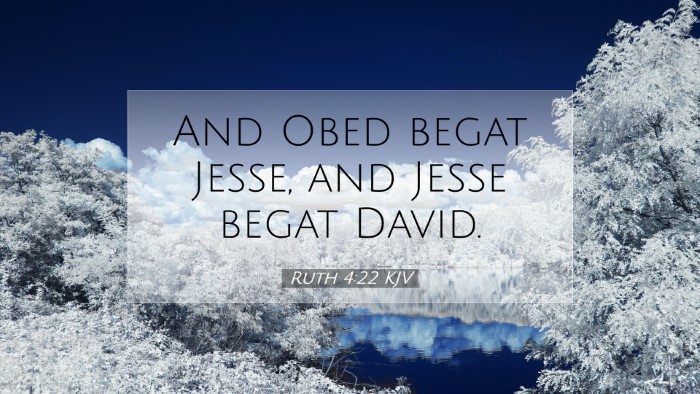Old Testament
Genesis Exodus Leviticus Numbers Deuteronomy Joshua Judges Ruth 1 Samuel 2 Samuel 1 Kings 2 Kings 1 Chronicles 2 Chronicles Ezra Nehemiah Esther Job Psalms Proverbs Ecclesiastes Song of Solomon Isaiah Jeremiah Lamentations Ezekiel Daniel Hosea Joel Amos Obadiah Jonah Micah Nahum Habakkuk Zephaniah Haggai Zechariah MalachiRuth 4:22
Ruth 4:22 KJV
And Obed begat Jesse, and Jesse begat David.
Ruth 4:22 Bible Commentary
Commentary on Ruth 4:22
Bible Verse: Ruth 4:22 - "Boaz begat Obed; and Obed begat Jesse; and Jesse begat David."
Introduction
This concluding verse of the Book of Ruth encapsulates significant themes of legacy, redemption, and divine providence. The genealogy presented serves as a bridge linking Ruth, a Moabitess, to the great King David, emphasizing God's sovereignty in history and the unfolding of His redemptive plan through ordinary lives. This commentary synthesizes insights from Matthew Henry, Albert Barnes, and Adam Clarke to provide a comprehensive examination of Ruth 4:22.
The Context of Ruth 4:22
This verse comes at the conclusion of a narrative that highlights loyalty, love, and God's providence. After a series of events involving Naomi and her Moabite daughter-in-law Ruth, the story culminates in Ruth’s marriage to Boaz. This union and the resulting genealogy reveal the divine orchestration behind these human relationships and the broader implications for the lineage of David and ultimately, Jesus Christ.
Analysis of Key Figures
-
Boaz:
Boaz represents the archetype of a kinsman-redeemer defined in Mosaic Law. His act of marrying Ruth not only secured her kinship rights but also restored land to Naomi, thus fulfilling the Levirate obligations. His character exemplifies integrity and generosity, making him a model of faithfulness in covenant relationships. According to Matthew Henry, Boaz's righteousness serves as a manifestation of God’s grace in providing for those in need.
-
Ruth:
Ruth's loyalty and devotion stand out in this narrative. Her willingness to leave her homeland and her subsequent actions illustrate the transformative power of faith and commitment. As noted by Albert Barnes, Ruth's integration into Israel emphasizes the inclusivity of God’s redemptive plan, asserting that divine blessing transcends national boundaries.
-
Obed:
Obed, the child born to Boaz and Ruth, signifies the continuation of God's promises. His name means "servant," which reflects the humble service that marks the ongoing legacy of David's line. Adam Clarke highlights that Obed is pivotal in connecting the lineage of David with the Messianic lineage, hinting at the future glory of the Davidic covenant.
-
Jesse:
Jesse, the father of David, embodies the culmination of this lineage, showing how God often chooses the weak and lowly to accomplish His purposes. Matthew Henry reflects on how Jesse’s household became the seedbed for Israel’s greatest king, demonstrating God's ability to work through seemingly insignificant means to achieve greatness.
-
David:
David’s inclusion in this lineage is profound, as he is not only a historical figure but also a typological precursor to Christ. Albert Barnes notes that through this ancestry, Jesus Christ, the ultimate redeemer, fulfills the prophecies of the Old Testament. Thus, David's story is woven into the narrative of redemption that spans both the Old and New Testaments.
Theological Implications
Ruth 4:22 encapsulates several theological themes that are critical for understanding God’s redemptive plan:
-
Redemption:
The theme of redemption runs throughout the Book of Ruth. Boaz's role as a kinsman-redeemer is a foreshadowing of Christ's future work of redemption. The lineage that begins with Boaz and Ruth leads to David, illustrating how God’s redeeming love works through familial and covenantal relationships.
-
God’s Sovereignty:
This genealogy indicates that God is actively involved in history, orchestrating events for His purposes. Each name in the lineage carries weight and significance, demonstrating how God uses ordinary people to fulfill His divine plans. Adam Clarke notes the importance of recognizing divine providence in the seemingly mundane aspects of life.
-
Inclusivity and Grace:
Ruth’s status as a Moabitess highlights God’s inclusive grace. The Gospel’s reach extends beyond ethnic boundaries, as Ruth becomes an integral part of Israel's story. This serves as a precursor to the Great Commission, where Jesus sends His disciples to make disciples of all nations.
-
Hope and Continuation:
The genealogy communicates hope for future generations. Just as David came from humble beginnings, the anticipation of the Messiah emerges from the stories of ordinary people. This hope is central to Christian theology, offering assurance of God’s faithfulness through generations.
Conclusion
Ruth 4:22 serves not only as a summary of the text but also as a powerful testament to God’s redemptive work through His people. The interconnectedness of Boaz, Ruth, Obed, Jesse, and David illustrates that God’s purposes often unfold through the ordinary, guided by His extraordinary grace. As leaders, students, and scholars reflect on this passage, they are reminded of the significance of legacy, the beauty of redemption, and the vast expanse of God’s love that invites all into His covenant family.


